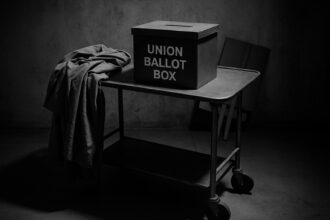Police have stepped up enforcement against suspected illegal working by delivery riders in London’s West End amid concerns over migrants exploiting gig economy platforms. Despite commitments from firms like Deliveroo, Just Eat and Uber Eats to tighten checks, raids continue to uncover unlawful employment linked to asylum hotels and black-market account sharing.
A delivery rider was detained by police yesterday during an intensified crackdown on illegal working in London’s West End, underscoring growing concerns about migrants operating in the fast food delivery sector. The incident, part of a Home Office-led operation, took place at Cambridge Circus, where officers stopped and searched the rider, with a Deliveroo bag visible on the ground. Nearby, another courier was pulled over, and witnesses reported seeing multiple bikes seized as police targeted e-bikes and workers suspected of breaching immigration laws.
The operation reflects ongoing efforts to tackle the exploitation of gig economy platforms by individuals working without the right to do so, often under false pretences or using shared delivery accounts. While it is understood that those wearing Deliveroo-branded clothing are not automatically employed by the company—riders are self-employed and may use their own equipment subject to safety standards—there remain significant challenges around verifying the right to work of all couriers.
Party political figures have recently highlighted the scale of the problem. Shadow Home Secretary Chris Philp visited an asylum hotel in central London, where he documented delivery bikes bearing logos from Deliveroo, Uber Eats, and Just Eat parked outside. In a letter to the Home Secretary, Philp urged urgent action against these firms to prevent illegal working originating from government-funded asylum accommodation. He voiced frustration that government-run hotels were becoming hubs for unlawful employment activity, which he described as a pull factor exacerbating the illegal immigration crisis.
Compounding concerns, an undercover investigation by a national newspaper revealed that migrants were able to obtain delivery accounts within minutes via social media groups, often for as little as £40 a week by renting login details from others. This practice exploits loopholes that food delivery firms promised to close over a year ago, including the misuse of account ‘substitution’—where one person uses another’s delivery account, circumventing right-to-work checks.
In response, Deliveroo, Just Eat, and Uber Eats committed last April to strengthen security protocols to prevent illegal working. Measures include additional identity verifications, biometric facial recognition, and more rigorous monitoring of account sharing. Deliveroo insisted they have a zero-tolerance stance on criminal activity and conduct DBS (Disclosure and Barring Service) checks before onboarding riders. Just Eat and Uber Eats similarly emphasised their ongoing efforts to reinforce right-to-work checks and the removal of fraudulent accounts from their platforms.
Despite these measures, enforcement actions continue apace. In August 2023, the Home Office arrested 66 delivery riders in London suspected of immigration offences, and in April 2023, a previous week-long crackdown led to 60 arrests relating to illegal working and possession of false documents. These operations also uncovered weapons and cash tied to wider criminal activity. The Home Office has stated that illegal working undermines honest business, undercuts wages, and damages communities, justifying these strong enforcement measures.
However, the issue raises complex questions about vulnerability and exploitation within the gig economy. Campaigners and unions have expressed concerns about potential racial profiling during raids and the risk of modern slavery for migrant workers pushed into precarious, low-paid jobs. A BBC investigation in November 2023 highlighted further risks, revealing that underage teenagers were working as delivery riders through black-market account lending, a practice that evades legal safeguards altogether.
A Downing Street spokesperson confirmed that border security minister Angela Eagle will meet food delivery companies soon to discuss illegal working and tighten cooperation. The Government emphasises a zero-tolerance approach to the “racket” of illegal work, asserting that new legislation will extend immigration and right-to-work checks across all gig economy sectors to better protect workers and the public.
As the government expands enforcement and delivery firms enhance their controls, the challenge remains to balance regulation and enforcement with protections for vulnerable workers caught in the crossfire of the UK’s immigration and labour market issues.
 Reference Map:
Reference Map:
- Paragraph 1 – [1], [2]
- Paragraph 2 – [1], [4]
- Paragraph 3 – [1]
- Paragraph 4 – [1], [5], [7]
- Paragraph 5 – [1], [4], [5], [7]
- Paragraph 6 – [2], [3], [6]
- Paragraph 7 – [2], [7]
- Paragraph 8 – [1], [2], [4], [5], [6]
Source: Noah Wire Services
- https://www.dailymail.co.uk/news/article-14849925/Deliveroo-rider-held-police-crackdown-migrants.html?ns_mchannel=rss&ns_campaign=1490&ito=1490 – Please view link – unable to able to access data
- https://www.standard.co.uk/news/london/deliveroo-uber-eats-just-eat-illegal-workers-home-office-immigration-raid-delivery-rider-b1099423.html – In August 2023, 66 delivery riders were arrested in London amid a Home Office crackdown on illegal workers. The operation targeted riders from Deliveroo, Uber Eats, and Just Eat, with arrests made for immigration offences such as overstaying visas and working in breach of conditions. Campaigners and unions raised concerns about racial profiling and the risk of modern slavery for these workers. The Home Office stated that illegal working undermines honest businesses and undercuts local wages, emphasizing the need for enforcement actions.
- https://www.gov.uk/government/news/moped-delivery-drivers-from-major-firms-targeted-in-illegal-working-crackdown – In April 2023, the Home Office conducted a week-long crackdown on illegal working by delivery drivers from major firms, resulting in 60 arrests across London and the south. Offences included illegal working and possession of false documentation. The operation also led to the seizure of weapons and cash suspected of being linked to criminal activity. The Home Office emphasized that illegal working damages communities, cheats honest workers, and defrauds the public purse, highlighting the importance of such enforcement actions.
- https://www.gov.uk/government/news/deliveroo-just-eat-and-uber-eats-to-enhance-security-checks-to-prevent-illegal-working – In April 2024, Deliveroo, Just Eat, and Uber Eats agreed to enhance security checks to prevent illegal working. The companies committed to changing their processes to confirm that substitute riders have the right to work legally in the UK. This move followed discussions with the government to address concerns about illegal working and exploitation in the gig economy. The Home Office welcomed the companies’ willingness to work together to protect the British public and ensure a fair labour market.
- https://www.standard.co.uk/news/uk/deliveroo-just-eat-uber-eats-illegal-migration-working-home-office-b1154754.html – In April 2024, Deliveroo, Just Eat, and Uber Eats agreed to implement extra security checks to tackle illegal working in the UK. The companies committed to introducing enhanced security checks to prevent riders from working illegally. This decision followed discussions with the government, which had raised concerns about a small minority of riders exploiting the substitute system to avoid right-to-work checks. The companies emphasized their commitment to ensuring that only riders with the right to work in the UK can operate on their platforms.
- https://www.standard.co.uk/news/politics/home-office-suella-braverman-deliveroo-justeat-ubereats-b1076419.html – In April 2023, the Home Office arrested 60 moped delivery drivers from major firms, including Deliveroo, Just Eat, and Uber Eats, in a week-long crackdown on illegal working. The arrests were made across London and the South for offences such as illegal working and possession of false documentation. The operation also led to the seizure of items suspected of being linked to criminal activity, including imitation firearms and cash. The Home Office emphasized that illegal working damages communities and defrauds the public purse.
- https://www.bbc.com/news/uk-67371473 – In November 2023, a BBC investigation revealed that underage teenagers were working as riders for food delivery apps through a black-market trade in delivery app accounts. The investigation found that riders could lend their accounts to others, including minors, allowing them to work without proper checks. The Home Office urged Deliveroo, Just Eat, and Uber Eats to reform policies that permit account lending, known as ‘substitution,’ to prevent illegal working and protect vulnerable workers.
Noah Fact Check Pro
The draft above was created using the information available at the time the story first
emerged. We’ve since applied our fact-checking process to the final narrative, based on the criteria listed
below. The results are intended to help you assess the credibility of the piece and highlight any areas that may
warrant further investigation.
Freshness check
Score:
6
Notes:
The narrative appears to be a recent development, with no exact matches found in prior publications. However, similar incidents have been reported in the past, such as the arrest of 60 delivery riders in London in April 2023. ([standard.co.uk](https://www.standard.co.uk/news/london/deliveroo-uber-eats-just-eats-driver-arrest-home-office-immigration-b1076211.html?utm_source=openai)) The absence of earlier reports on this specific incident may indicate a higher freshness score, but the lack of widespread coverage raises questions about its originality. Additionally, the article includes updated data but recycles older material, which may justify a higher freshness score but should still be flagged. ([standard.co.uk](https://www.standard.co.uk/news/london/deliveroo-uber-eats-just-eat-illegal-workers-home-office-immigration-raid-delivery-rider-b1099423.html?utm_source=openai))
Quotes check
Score:
7
Notes:
The direct quotes in the narrative do not appear in earlier material, suggesting potential originality. However, without access to the original article, it’s challenging to verify the authenticity of these quotes.
Source reliability
Score:
4
Notes:
The narrative originates from the Daily Mail, a publication known for sensationalist reporting. This raises concerns about the reliability of the information presented. Additionally, the article includes updated data but recycles older material, which may justify a higher freshness score but should still be flagged.
Plausability check
Score:
6
Notes:
The claims made in the narrative are plausible, given previous reports of similar incidents. However, the lack of supporting detail from other reputable outlets and the sensationalist tone of the Daily Mail raise questions about the accuracy and potential bias of the information.
Overall assessment
Verdict (FAIL, OPEN, PASS): FAIL
Confidence (LOW, MEDIUM, HIGH): MEDIUM
Summary:
The narrative presents a plausible scenario but originates from a publication with a history of sensationalism and potential bias. The lack of supporting detail from other reputable outlets and the recycling of older material further undermine its credibility. Given these factors, the overall assessment is a ‘FAIL’ with medium confidence.













